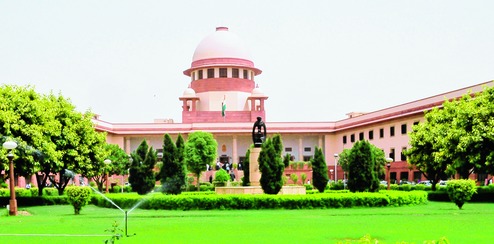
Protocol dictates that we use the word "honourable" while talking about courts of justice. They are considered to be vital to the running and existence of a democracy.
Though the very fabric of democracy was intended in such a way that each of its three foundation stones, namely the legislature, judiciary and executive could be held responsible for discrepancies and unwarranted actions, the legislature has to go through the drill of being elected directly by the people (or by those who represent the people) every five years.
As much as we might point fingers at corrupt practices of the politicians, they do have to prove their worth in each round of election. Alarming are the situations when money or tampered voting machines change the fate of this powerful tool of putting a check on the legislature.
The executive has it easy: once selected for a job, they are hardly ever sacked from their positions.
Bureaucrats change their tunes according to the party in power, in many cases, overlooking and participating in the corruption. They are, in the worst case scenario, transferred to a distant location or given inadequate job responsibility.
But apart from that, they enjoy the most unhindered workplace. And then comes the judiciary. In India, the judiciary is very closely connected to the legislature. Now, before the proverbial gun is jumped and I am termed an "anti-national", allow me to explain. Article 124 of the Constitution delineates the methods for the appointment of any of the 26 judges of the Supreme Court. It says that it must be done in "consultation" with the Chief Justice of India, who is a part of the collegium which sends its "recommendations" to the President. This system of recruitment is dubious for three major reasons:
• The party in power can influence the list of "recommended" candidates before it is sent to the President;
• The party in power can influence the list of "recommended" candidates after it is sent to the President;
• The collegium can make "recommendations" based on personal preferences.
In the above three points, in most cases, the word "can" is replaced by the word "does"! We are wary of nepotism in other spheres of public services but we unfortunately ignore the extreme nepotism present in the selection and appointment of judges in the country. By rough estimates, 30-35 per cent of Supreme Court lawyers and eventual judges are secondhird generation law graduates in their respective families.
The four Supreme Court judges who addressed a press conference in January 2018 tried to highlight the ills which plague the judiciary. This was the first time in the history of the country that judges had to speak up against their own fraternity in interest of the citizens of the country. They had, before the fateful day of the conference, brought the issues to the CJI's notice by means of letters and verbal communication. They said the death of special CBI judge Justice Loya and the roster of justices of the Supreme Court was the last straw, which led them to voice their concerns. Four unrelated judges pointed the "less than desirable" practices of the apex court in the recent years.
Their laments were largely about an enslaved judiciary unable to function without receiving approval nods from those in power. Many more judges and lawyers spoke in their support after the press conference. So, the question is, should we not reform the systems which govern the functioning of the honourable Supreme Court? Justice is one of the strongest pillars of a democracy and it must maintain autonomy. Along with the Supreme Court, other lower courts too need to review their selection processes.
When there is a single Constitution which is applicable to the whole of India, why are there state-level judiciary exams with different questions and divergent ideologies for the selection of candidates? Justice, in its very conception, must be equal for all and unbiased in all possible ways. The blindfold on the goddess of justice surely does not mean turning a blind eye to the public's genuine concerns. One wishes that the blindfold be taken off so that she can see how badly her scales are tipping in favour of those who are clenching power and money in their fists. The country does not need new laws. It needs better implementation of the existing ones.
With all this constructive criticism for the judiciary, one must applaud them for their stance on the Aadhaar Card. The honourable Supreme Court managed to get an admission from the government that it lied to the public by forcing the people to link Aadhaar to mobile phone numbers. Only one question remains: how do we de-link the Aadhaar from our phones?
The writer is lecturer, Delhi University, and author of Voter Mata Ki Jai










